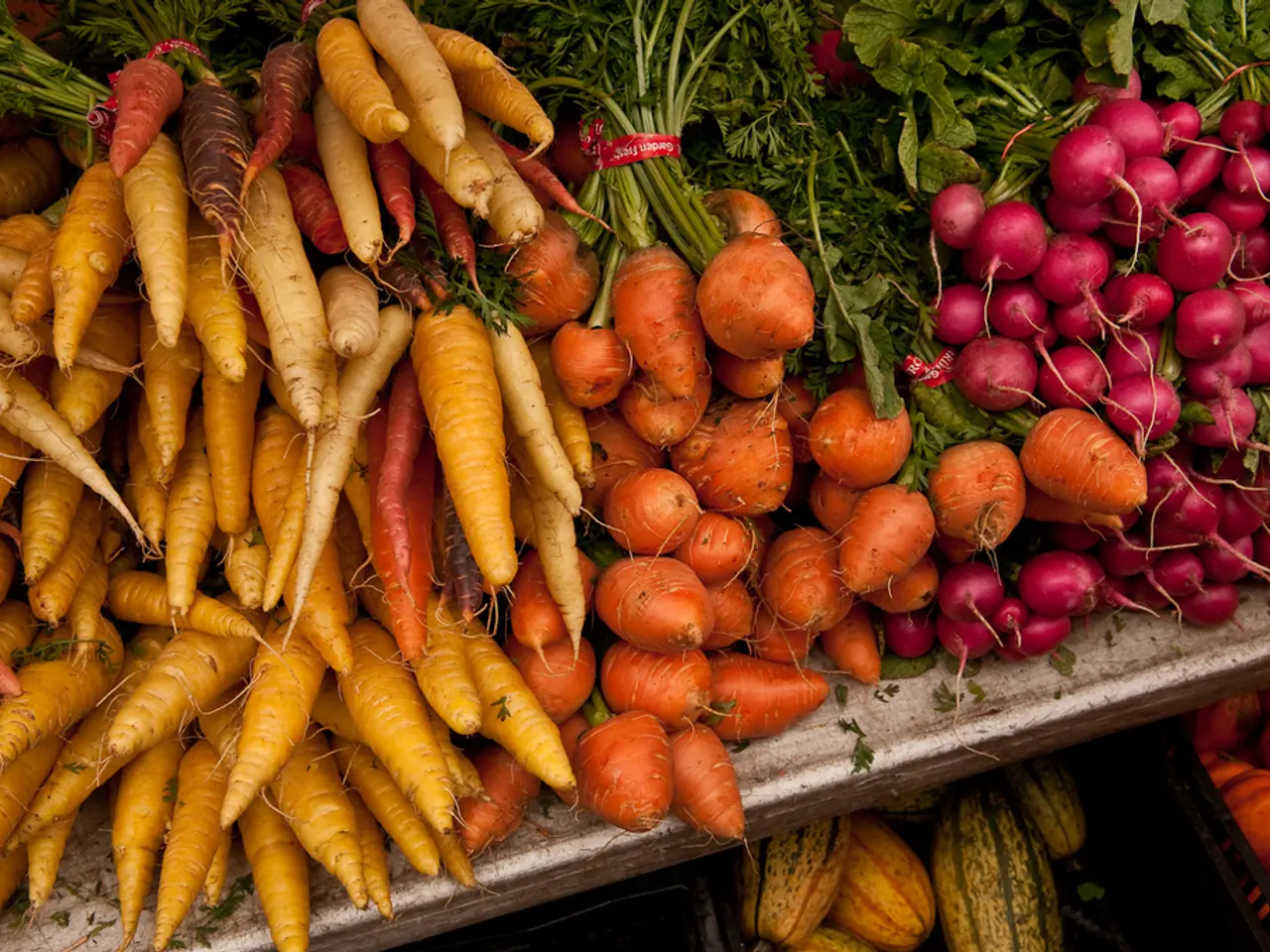Comprehensive Guide on Sustainable Homegrown Produce: Organic Vegetable Cultivation Basics
Organic farming of vegetables is gaining popularity worldwide, including in India, as more farmers embrace traditional methods to cultivate produce. This approach, which shuns synthetic pesticides, herbicides, and fertilizers, instead relying on natural inputs such as compost, manure, and green manure, is proving to be a sustainable and healthier alternative.
Common practices in organic vegetable farming include crop rotation and intercropping, fostering beneficial insects for pest control, reducing tillage, and maintaining biodiversity through diverse crops and habitats. The focus is on sustainability, environmental health, and the production of chemical-free, healthy food.
Sustainable water management in organic farming includes stream watering, water conservation, and the use of mulch to save water and maintain moisture levels. By avoiding the use of harmful chemicals, organic farming reduces pollution, protects natural systems, and preserves resources for future generations.
Soil success in organic farming is achieved through the use of compost, animal manure, cover crops, and purchased fertilizer to enhance soil quality. This results in a healthier soil structure, improved fertility, and increased microbial activity, which sustains productivity over time.
The benefits of organic vegetable farming compared to conventional methods are numerous. Organic produce contains fewer pesticide residues, lowering potential health risks, especially for children and vulnerable groups. Organic vegetables often have more antioxidants, vitamins, and minerals, contributing to a healthier diet.
Organic farming also enhances biodiversity, supporting about 30-50% greater species richness, including beneficial insects and pollinators, promoting ecosystem resilience and natural pest control. It reduces pesticide use by about 90%, decreases greenhouse gas emissions by 10-30%, improves water quality by minimizing chemical runoff, and sequesters more carbon in soil compared to conventional farming.
Organic systems tend to maintain stable yields over the long term due to healthier soils and ecosystems, whereas conventional systems face risks from soil degradation and input dependence. Organic farming practices also offer better financial opportunities for small-scale farmers by reducing their reliance on expensive inputs and providing them access to premium markets.
When livestock are part of organic farming, they have outdoor access, organic feed, and are raised without antibiotics or synthetic hormones. Additionally, organic vegetables are free from harmful pesticides, herbicides, or synthetic fertilizers, making them safer and of higher quality for consumers.
In contrast, conventional vegetable farming often relies heavily on synthetic chemicals, may deplete soil organic matter and biodiversity, has a higher carbon footprint, and carries risks of chemical residues and environmental pollution. Organic practices focus on ecological balance and long-term sustainability, offering health, environmental, and ethical benefits.
- Embracing organic farming practices in the workplace-wellness program could lead to the production of chemical-free, healthier food for employees, advocating for their health-and-wellness.
- To incorporate fitness-and-exercise into organic farming, one could use techniques like fitness-tracking devices to monitor physical activity when performing tasks like planting or harvesting.
- A possible link between organic farming and sexual-health could involve the reduction of environmental pollutants from synthetic pesticides, potentially lowering the risk of adverse reproductive health effects.
- For men's-health, switching to organic food products, grown locally through organic farming, might result in the consumption of fewer chemicals linked to various health issues.
- In the realm of skin-care, choosing to use organic produce in cooking could minimize potential exposure to harmful pesticides, supporting healthier skin.
- Therapies-and-treatments for aging could consider organic farming as part of holistic approaches to senior wellness, including Medicare-covered services related to healthy-cooking, lifestyle modifications, and food-and-drink choices.
- Some cooking techniques for womens-health might emphasize the use of organic ingredients, ensuring fewer pesticide residues, especially during pregnant or nursing periods, supporting the wellbeing of both mother and child.
- Parenting may involve lessons about the importance of organic food and its impact on children's health, leading to an emphasis on weight-management and healthier choices for family meals.
- To explore alternative therapies for managing weight, one could investigate the role of CBD-infused food products derived from organically-grown hemp, with potential benefits for metabolism and appetite control.
- In the home-and-garden sector, organic farming practices could be promoted as sustainable and environmentally-friendly methods for gardening enthusiasts, fostering a healthy-cooking lifestyle through homegrown produce.
- Nutritionists could advise their clients to prioritize food-and-drink choices that align with the principles of organic farming, such as diversity, soil health, and chemical-free production, supporting overall health and wellbeing.




